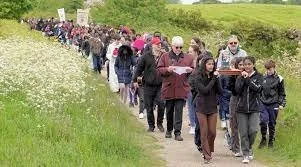Weaving Together the Beloved Community - Pilgrimage
“Are we asked to do so to some geographical place? Or, … is there a ceremonial pilgrimage we need to take to reflect on the path to which God is calling us?”
Pilgrimage, as a spiritual practice, began to wane when the pilgrimages to the Holy Land came to an end. Muslim control over much of the Holy Land made travel to places like Jerusalem problematic. Christian cathedrals adjusted by designing labyrinths to reflect the pilgrimage people might make over long geographic distances.
As we begin Epiphany with the Magi making pilgrimage to Bethlehem, the Holy Family making pilgrimage to Egypt to escape persecution and then back home again to Nazareth, and Jesus beginning his public ministry with his baptism and pilgrimage into the wilderness, what pilgrimage are we called to in this day and age?
Are we asked to do so to some geographical place? Or, like those pilgrims who could not make it to the Holy Land, is there a ceremonial pilgrimage we need to take to reflect on the path to which God is calling us?
I have used labyrinths as holy space to symbolize beginnings and endings of church camp for children. Parents have remarked that they have never experienced their children so quiet and reflective. Children become aware that they are walking on holy and sacred space.
Our spirituality has been too often relegated to sitting quietly or reading and study without much activity. If your spirituality is anything like mine, however, I experience the Divine when I am in locomotion, moving. Most nights I take a short pilgrimage down to Lake Michigan for meditation. The walking is just as important a spiritual practice as my meditation.
What daily, regular, or planned pilgrimages do we continue to make or plan to make which bring meaning to our lives? If none, how do we begin? And what does our story tell us about the meaning of pilgrimage?
Planned Book Study, Jesus and John Wayne
Rev. Mulberry is planning a future book study of Kristin Kobes du Mez’s best-selling book, Jesus and John Wayne: How White Evangelicals Corrupted a Faith and Fractured a Nation. Kobes du Mez teaches at Calvin University in Grand Rapids and her book has become a source for reflection and discernment for many Christian churches. The strength of her book is in observing the history, telling it with interest, without making much commentary on it herself. If you are interested in the study, please let Rev. Mulberry know.
✝

